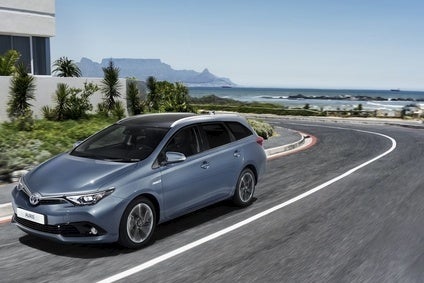
New 1.6 and two-litre diesel engines for Toyota Motor Europe’s revised Auris [Corolla] and Avensis model lines, launched at the Geneva show last week, are supplied by BMW, just-auto has learned.
“Yes, the new 1.6 diesel is sourced from BMW, as is the 2.0 D in Avensis,” a Toyota GB spokesman confirmed by email.

Discover B2B Marketing That Performs
Combine business intelligence and editorial excellence to reach engaged professionals across 36 leading media platforms.
The Japanese automaker first tapped the German firm for diesels in 2013 when a BMW 1.6 either replaced or supplemented Toyota’s own two-litre unit in some versions of the Verso MPV/minivan according to market. Here in the UK, the 1.6 completely replaced the two-litre.
Now, much the same is happening with the Auris and Avensis.
A new BMW 1,598cc turbo diesel is making its first appearance in the Auris range, replacing a two-litre unit branded ‘D-4D’ that has been available in some European markets.
It develops 110bhp and maximum torque of 270Nm between 1,750 and 2,250rpm. This accelerates the Auris 1.6 D-4D hatch from 0–62mph in 10.5 seconds and on to a top speed of 118mph.
CO2 emissions are lower than the outgoing 2.0 D-4D at 104g/km. Average fuel consumption is 68.9mpg. Cost of ownership is further reduced by new, extended servicing intervals, TME said.
The BMW engine supplements the Toyota 1,364cc D-4D turbodiesel upgraded in the latest Auris to comply with Euro 6 regulations.
Other changes to this motor, to improve performance and reduce emissions, include a new turbocharger which reduces friction in the turbine shaft by 20% and improves efficiency to generate a higher boost pressure at low engine speeds.
The engine has a new solenoid fuel injection system with a larger supply pump and higher common rail injection pressure (180mpa). A NOx storage reduction (NSR) catalyst has been adopted within the exhaust system to meet the Euro 6 requirement for a 55% reduction in Nox.
A new piston design with an open chamber combustion bowl improves fuel economy by 3.4%. The new pistons feature a diamond-like carbon coating which reduces friction and thus supports lower fuel consumption.
A new plastic cylinder head cover reduces component weight by 40% and offers improvements to both camshaft lubrication and oil capture performance.
The engine develops 89bhp. The breadth of torque generation has been expanded 400rpm lower down the rev range with a maximum 205Nm now available from 1,400rpm to 2,800rpm. The Auris 1.4 D-4D hatchback will accelerate from rest to 62mph in 12.5 seconds and reach a maximum speed of 112mph.
Toyota also introduced a new, in-house, 1.2-litre turbocharged petrol engine with the Auris update, replacing an older 1.6.
The second facelift of the Avensis, meanwhile, introduces new 1.6 and two-litre BMW diesels to the range.
Both are branded ‘D-4D’ and the two-litre version is new to Toyota.
The 1.6 emits 108g/km of CO2, 11g/km less than the two-litre it replaces. The new BMW two-litre diesel’s 119g/km is a 24g/km reduction compared with the outgoing Toyota 2.2-litre unit.
An increase in service intervals to 12,000 miles (20,000km) and a reduction of about 20% in the 90,000km/three-year servicing costs for both units have helped make the diesels cheaper to run, TME claimed.
BMW’s 1.6 replaces a Toyota two-litre unit, is Euro 6-compliant, and with a six-speed manual transmission, is 20kg lighter than its predecessor. It develops 110bhp at 4,000rpm and 270Nm of torque from 1,750 to 2,250rpm. This gives 0 – 62mph acceleration in 11.4 seconds and a top speed of 112mph.
The engine achieves an 8% improvement in fuel efficiency compared to the previous 2.0 with combined cycle fuel consumption of 68.9mpg.
The new Euro 6-compliant two-litre BMW D-4D has been tuned for a stronger focus on performance.
It develops a maximum 141bhp at 4,000rpm and 320Nm of torque from 1,750 to 2,500rpm. TME said its linear torque build-up and willingness to rev gives it particularly strong in-gear responsiveness and acceleration: it will move the car from rest to 62mph in 9.5 seconds and reach a top speed of 124mph.
Stop and start technology, coupled with a tall sixth gear for motorway cruising, help the engine return average fuel consumption of 62.8mpg.
Additional reporting: Glenn Brooks






